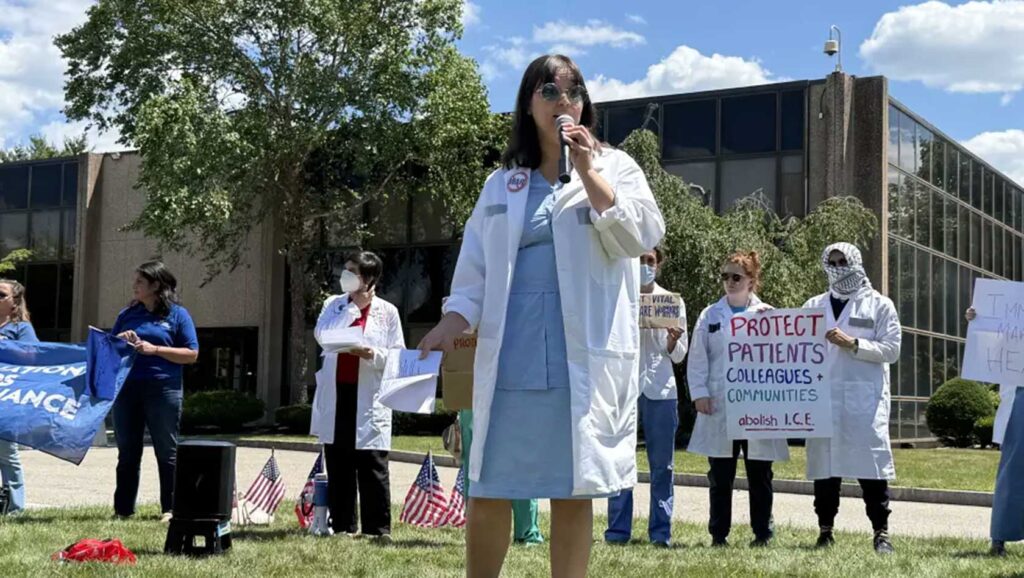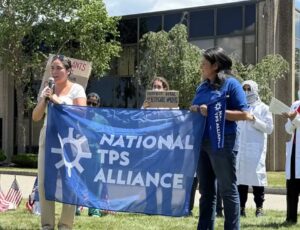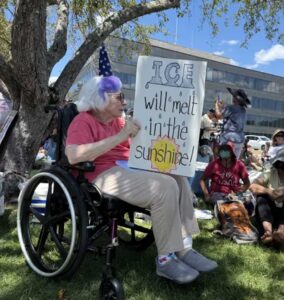Immigration policy shifts are already costing health workers their jobs in Massachusetts

Some health and home care providers in Massachusetts have recently laid off staff because of the Trump administration’s crackdown on immigration, according to advocates and employer associations.
One service provider reached out to Home Care Alliance of Massachusetts after receiving a Department of Homeland Security notice asking it to verify the employment documents of hundreds of its aides in the United States under a parole program for Cubans, Haitians, Nicaraguans and Venezuelans, who recently lost their legal status during an ongoing court battle.
“The concern was that they were going to have to terminate hundreds of them,” said Jake Krilovich, executive director of the group.

Medical assistant Mileyda Cruz speaks to reporters and advocates about her fears of having her work permit revoked next year, and being deported to El Salvador. PHOTO: SARAH BETANCOURT/GBH NEWS
He said the provider didn’t have to fire hundreds of employees as they initially feared, but they did still lose a number of workers. He said a second provider immediately laid off 12 home health aides.
“Given our workforce shortages at this time, any number of aides, whether it’s five or 10, has a significant impact to access to care,” Krilovich said.
Physicians and advocates are calling on the Trump administration to stop terminating work permits for immigrants of varying legal statuses and protections — some who have recently lost status, are about to lose it, and will lose it next year.
At a rally on Wednesday in front of the Burlington ICE processing center, speakers noted that the policies have had a big impact in Massachusetts, where one in four healthcare workers are immigrants. The share is even higher for home health aides, which had a 46% foreign-born workforce even before the recent influx of migrants to the state. The problem is heightened by a growing need for the health care and home care workers to support aging seniors.
“In Greater Boston, over half of all nursing assistants are immigrants. Over half. Who is going to be caring for you?” said Jessica Santos, director of the Leah Zallman Center for Immigrant Health Research.
Physicians told GBH News that in some circumstances, immigrants who still held valid work permits lost their jobs due to confusion about immigration policy changes. Providers and other health and home care workers are worried about what can happen next.

Sally Bermudes, 89, lives in an assisted living facility and attended a rally seeking to keep immigrant health care workers employed. PHOTO: SARAH BETANCOURT/GBH NEWS
Mileyda Cruz, 25, came to the U.S. from El Salvador as a toddler and was raised in Worcester. She has temporary protected status, which allows her to work and live in the country legally. That status is set to expire next year.
“The only thing we are here to do is to work and live a safe life,” she said. “We have contributed so many dollars in taxes. All we want is to provide a safe life for our families.”
She’s been a medical assistant at a practice that works with seniors for five years, and is currently in nursing school. She has two children and fears separation if she were deported.
“My daughter was born here and even for me, it would be hard to have to go back [to El Salvador],” Cruz said in an interview with GBH News. “I wouldn’t want her to have to go through the same thing — so I know possibly leaving her here would be the best option for her.”
Cruz said half of her colleagues have protected legal statuses that are currently being revoked. She was out with the Massachusetts TPS Committee to advocate for their work permits to remain valid, and the Trump administration to consider allowing them to remain in the country beyond TPS’ current expiration date for El Salvador, and the many other countries of origin for TPS holders.
Rally attendees also discussed the impact of ICE sightings and detentions, including patients skipping cancer screenings or not calling 911 if they have a medical emergency.
“Our coworkers, housekeepers, nursing assistants, and fellow residents don’t know if ICE will be at the hospital when they show up to work in the morning,” said Anisah Hashmi, a psychiatrist in her last year of residency and union member of the SEIU’s Committee of Interns and Residents.
Sarah Betancourt is a bilingual reporter for GBH News.






